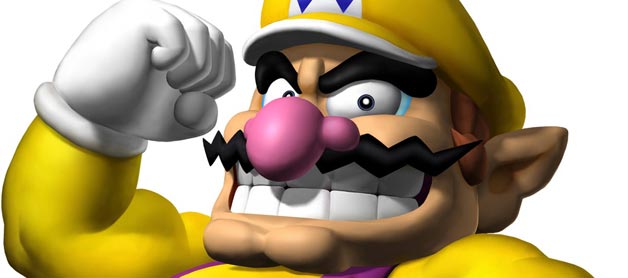
Every series has a starting point where it tries to find its own way out of the norm and make a difference in the wide spectrum of video games. At this moment, the driving force behind the series must be defined. Is the focus a new gameplay style that hasn’t been seen before? Is it a build-off of a prior series with its own twists? Or is it the characters and the story that makes the series develop a unique personality?
Wario Land is the rare series that can answer all three of those questions with a resounding "yes.” Having its roots as Super Mario Land 3 (similar to how Yoshi's Island began as a sequel to Super Mario World), it owes quite a bit to the red-capped hero's success. However, In the later games, Wario's character was explored more, giving him the greedy, power-driven attitude that he has today.
Wario's history is not the longest, nor is it the most famous, but a majority of Wario's fans are probably more familiar with his WarioWare series of five-second games than his platforming talents. However, with the recent release of the original Wario Land on 3DSWare, this is the perfect time for a brief look back on the story of Nintendo’s garlic-munching antihero.
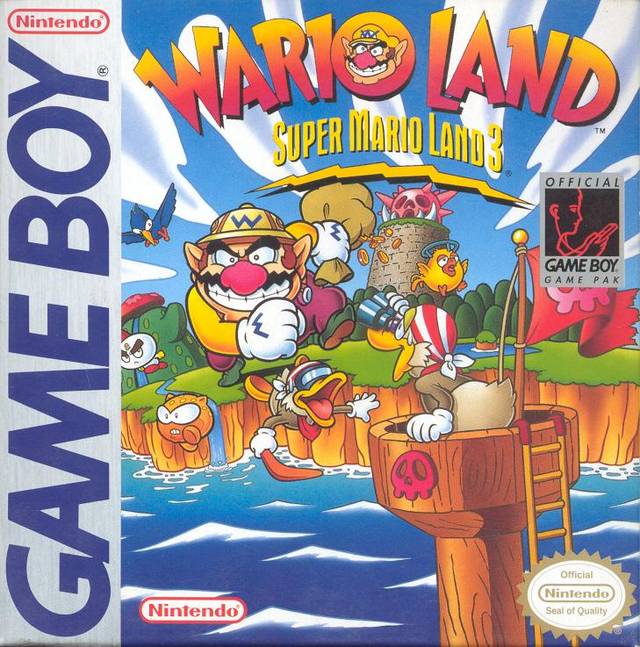
Super Mario Land 3: Wario Land (1994)
Wario Land, as a whole, is less a Wario Game and more a parody of the original Mario Land titles. Wario is not out to save a princess or reclaim his home, but to simply get as much treasure as possible. Coins do not serve the purpose of obtaining lives, but are used for an end-game tally that measures just how fantastic Wario's new home will be. The power-ups are variations of other Mario powers from the series: Wario wolfs down garlic instead of mushrooms, the Bunny Suit is replaced with a jet-powered arm charge, and a dragon's fire replaces the standard fireball.
The game's world map is somewhat standard fare, but the levels themselves are not. Wario not only has to reach the end of the stage, but several stages also hold treasure chests with valuable prizes that will add to his final coin total. Furthermore, the exit must be paid for with a 10-coin toll. The end of each stage lets Wario obtain more coins or lives by either a game of chance or a Duck Hunt-esque bomb toss.
Did you know… that the pause menu has an easter egg? By pressing the select button sixteen times, a small cursor will appear. Holding the A button and moving the cursor will allow the player to adjust his lives, hearts, and coins.
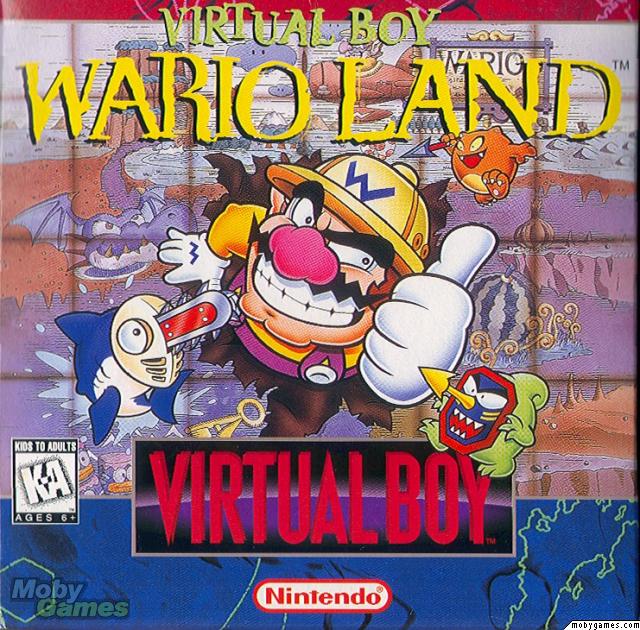
Virtual Boy Wario Land (1995)
Not taking many chances, Wario Land stayed close to the original in terms of gameplay. However, there were several differences made possible by the Virtual Boy’s 3D capabilities. For example, using special blocks gives Wario the ability to move from the foreground to the background, a technique that is seen in several 3DS games.
Did you know… that Virtual Boy Wario Land is considered by many to be the only reason anyone should ever own a Virtual Boy? The system was known for being very clunky to use and for causing eye strain due to its color scheme.
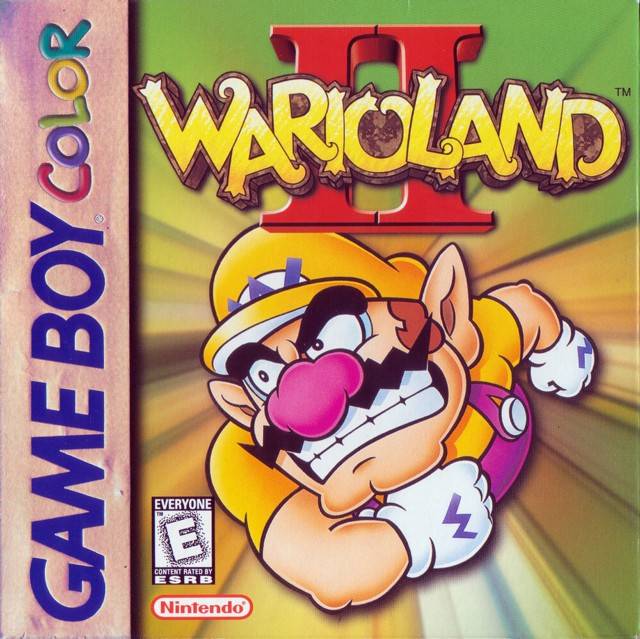
Wario Land II (1998/1999)
Released for both the Game Boy and the Game Boy Color, Wario Land II created a few distinct traits of its own. For one, it used a mission-oriented level system; while some were still about getting from point A to point B, others involved the destruction of a large enemy or turning off a faucet. Furthermore, Wario cannot die, and there are no lives. Being hit by a normal enemy would simply cause Wario to lose some of his precious coins, while other enemies could transform him into a variety of shapes. Eating an apple would make Wario obese and allow him to crush blocks below him, a bonk on the head would make him stumble around in a drunken-state spewing fireballs, and a hammer would turn him into a spring and cause him to bounce higher and higher.
Did you know… that Wario Land II is the only game in the series to feature multiple endings without measuring collectibles? A handful of levels have secret exits, with new worlds and bosses for Wario to fight. Only by beating every level (and winning the treasure in it) can the player gain access to the game's real ending.
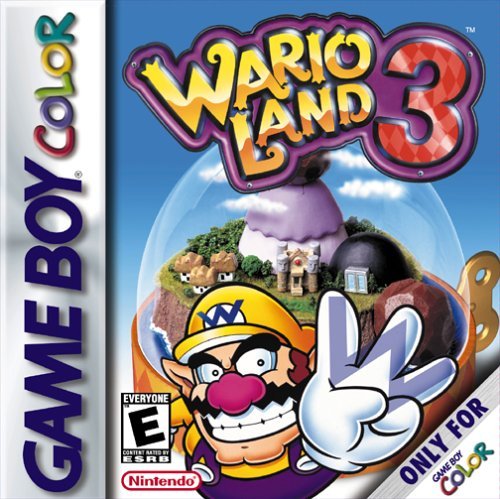
Wario Land 3 (2000)
Often considered to be the best in the series, Wario Land 3 built off of the gameplay style of its predecessor. After falling into a magical music box, Wario must collect five other music boxes to free the god that lies within. Though Wario is still invincible and can still transform, new elements were added. The levels are very large, each with four keys and treasure chests that alter the world map so Wario can get additional treasures and access new levels and abilities.
Also new to Wario Land 3 is a golf minigame that is required in order to access some of the treasure chests. It can also be played in full-fledged courses on the hub-world after reaching a certain goal.
Did you know… that Wario Land 3's enemies appeared in a Nintendo 64 title? Dr. Mario 64 hosts a majority of the Wario Land 3 enemies — including the final boss — as enemy characters in the game's story mode. Wario himself is also a playable character.
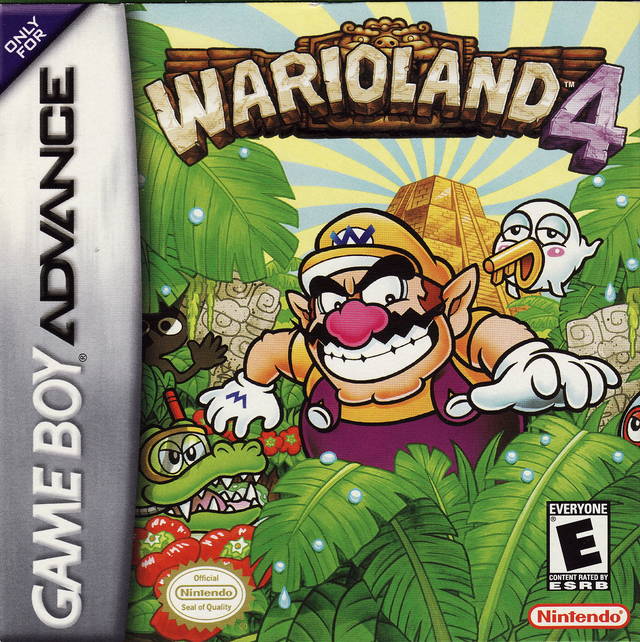
Wario Land 4 (2001)
Wario Land 4 is like a grab-bag of elements from the previous titles. While Wario can still transform, he now has a health bar. Furthermore, treasure chests are missing, with the keys (known as Keyzer in the game) now being used to unlock the next level or boss fight. Wario can also find CDs with little songs and purple pipes that lead to brainteasers that, when solved, give Wario some well-deserved money.
The levels are usually straightforward but involve going in circles. Each stage has a switch that creates a portal to the exit, but if Wario does not make it out in the time limit, he will lose the coins he collected in the stage.
Minigames appear again, with a simple baseball simulator, a matching game based on the creation of Wario's face, and a rhythm game where Wario must bounce over obstacles while running on a tire.
Did you know… that this is the first game in the series where Wario wears his yellow and purple outfit in-game? Wario's duds were black and white for the earlier entries.
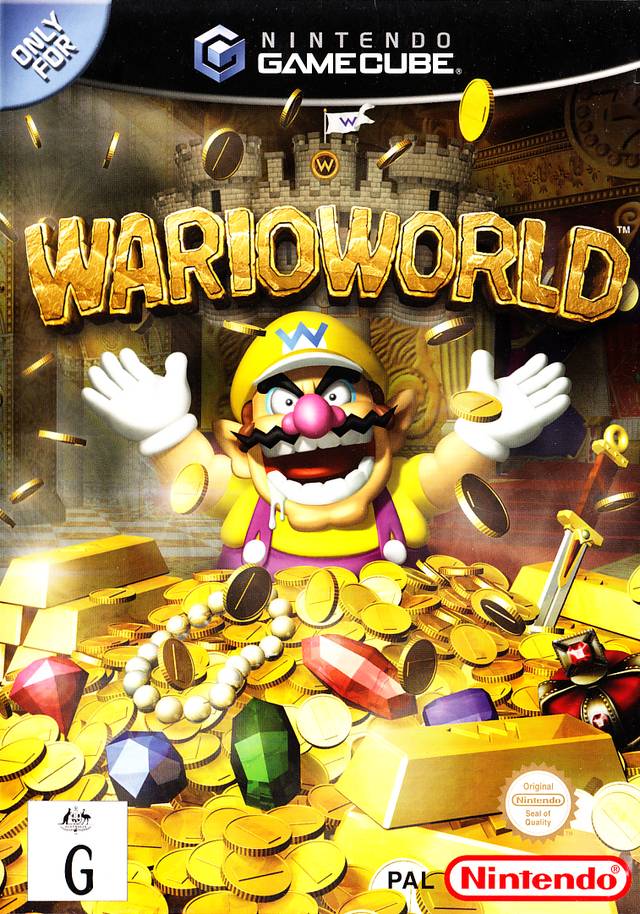
Wario World (2003)
Though not technically a part of the main series, Wario World is interesting in just how different it is. Set in a 3-D environment, Wario now uses special moves to knock out enemies as his main attack. He still chomps down on garlic and finds treasure chests, but also must find red diamonds that allow him to fight the level's bosses (of which there are several…more than there are levels, actually). Wario must also search for Spritelings, tiny creatures that affect the ending to the game.
Did you know… that Wario World was developed by Treasure? The company is well-known for their action titles such as Gunstar Heroes and Sin and Punishment.

Wario: Master of Disguise (2007)
Using the touch screen as a writing tool, Wario took on several forms in this game. Set in a television world, Wario steals a magic wand that allows him to change. He still has health in this game, and treasure is also abound (though a simple touch-based minigame is used to unlock them here).
Did you know… that the third boss can be beaten without going through the level? It's a simple riddle challenge, and the solutions are fairly obvious.
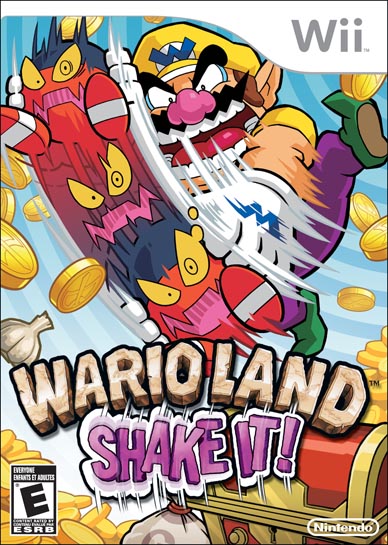
Wario Land: Shake It! (2008)
The most recent entry in the series, Wario Land: Shake It! returned the series to its basics. Bringing back older characters and gameplay mechanics (like the transformations, though they are used far less often), Shake It! also boasts incredible graphics, including an animated intro and ending made by Production I.G. (the studio known for making Ghost in the Shell)
Also returning is the time-limit to get to the beginning of the level after reaching a specific point and the elusive treasure chests. On top of that, there are a number of optional missions that Wario can complete, such as getting a specific number of coins or not taking any damage.
New to the game is the shaking mechanic, used to stun enemies or get coins from bags. Wario can also pound the ground with his fist by shaking, which is a technique used quite often in the game.
Did you know… that Shake It! had a bit of its soundtrack appear in an earlier game? Wario's victory theme from Super Smash Brothers Brawl uses a portion of the music in several of Shake It!'s stages.
Though it has been about four years since Wario has returned to his platforming roots, his journey has been a fun and memorable one. As the Wii U approaches and the 3DS ages, it's quite possible that Wario Land will return. Will it be redesigned again, or will it maintain its traditional gameplay style? All that can be predicted is that when Wario returns, he'll be ready to grab as much treasure as possible… and so will I.
VentureBeat's mission is to be a digital town square for technical decision-makers to gain knowledge about transformative enterprise technology and transact. Learn More
